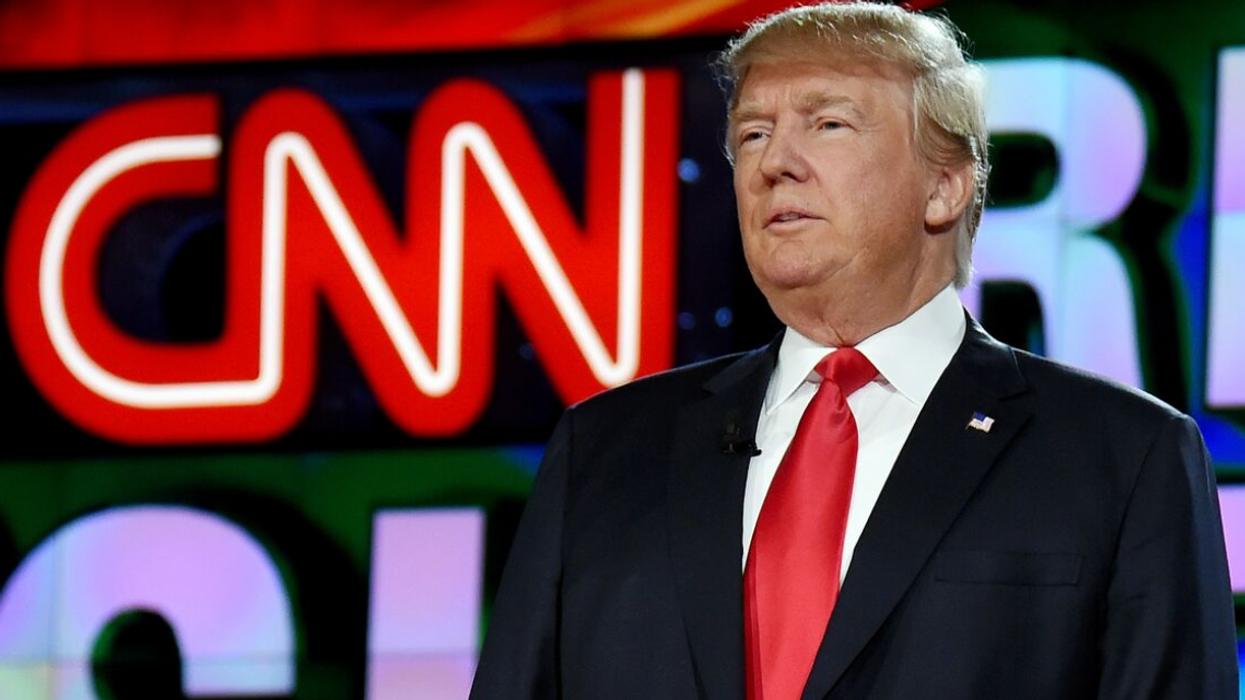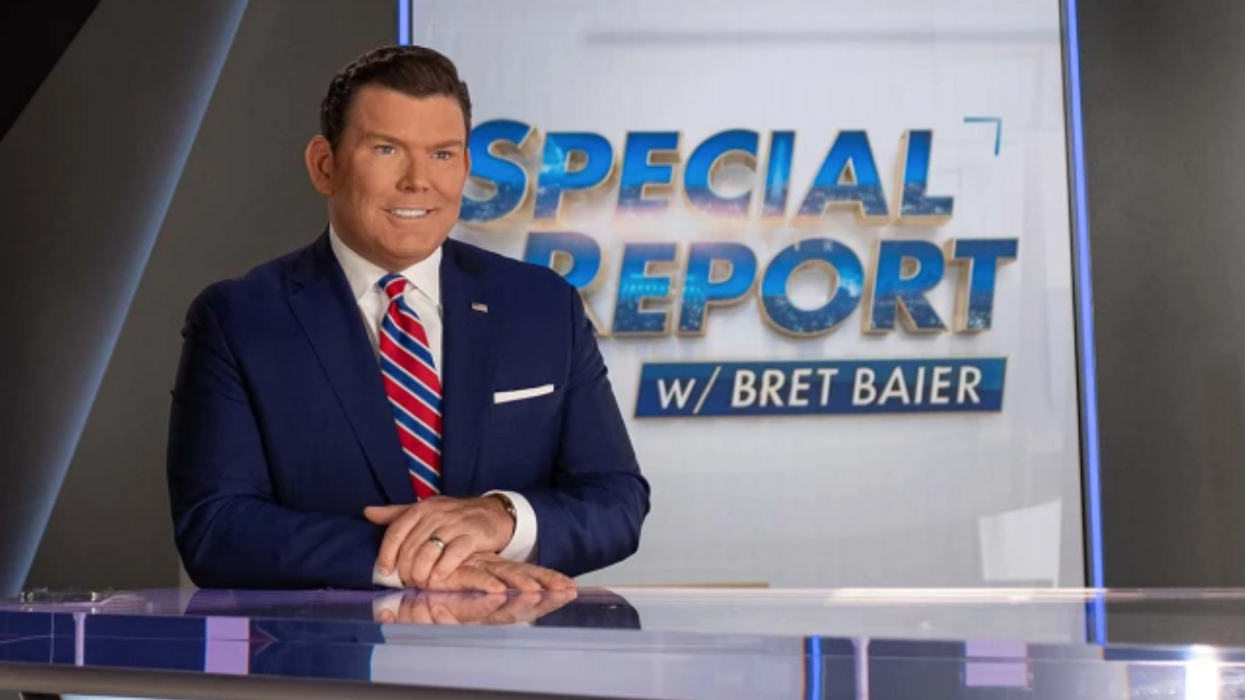Who knew that the name of a two-bit spray-tanned Fox News hack would be destined to be mentioned alongside the David Frost interview of Richard Nixon as a classic of the genre, but it appears that is where Monday’s Bret Baier Special Report interview with Donald Trump is headed. Well known celebrity interviewer Frost asked Nixon whether the president could do something illegal, such as taking action against certain anti-war groups “if he decides it’s in the best interest of the country or something,” to which Nixon infamously responded, “Well, when the president does it, that means it’s not illegal.” Forty-five million television viewers watched that night, a record for the largest audience for a political interview in history.
A much, much smaller audience was watching Fox when Trump claimed, for what must have been at least the thousandth time, “First of all, I won in 2020 by a lot, okay? Let’s get that straight.” Baier, holding a sheaf of paper that appeared to have lists not only of questions, but of facts, pushed back by reciting a long list of evidence to the contrary: “There were recounts in all the swing states. There was not significant evidence of fraud,” to which Trump replied, “We were trying to get recounts, real recounts, not just numbers of votes cast.”
Baier forged ahead: “There were lawsuits, more than 50 of them, in front of judges you appointed, that came up with no evidence, no evidence, and they looked at every potential case of voter fraud in six battleground states, and they found fewer than 475 cases.” Trump, babbling over Baier the whole time: “You know why? They weren’t looking at the right things. They were counting ballots, not the authenticity of ballots. The ballots were fake ballots. This was a very rigged election.”
But it was when Baier got into the meat of last week’s indictment of Trump for improperly removing and then mishandling top secret government documents, that the interview really went off the rails for Trump. Baier asked him when he was subpoenaed by the Department of Justice for the documents he held at Mar-a-Lago, “Why not just hand them over then?” It’s a simple question, and it would receive a simple, if legally incriminating and confounding response, but Trump’s answer shouldn’t be seen in print without this screenshot of his face when he heard Baier’s question:

I wish you could hear Trump’s tone, which resembled nothing more than the voice of a little boy who had been caught with a rock in his hand standing on the lawn of a house with a broken window: “Because I had boxes! I wanted to go through the boxes, and get all my personal things out…(sputters)…I don’t want to hand that over to NARA [National Archives and Records Administration] yet, and I was very busy, as you have sort have seen.” A B-roll of the indictment appears on the screen as Baier tirelessly presses on: “But according to the indictment, you then tell this aide to move [boxes] to other locations, after telling your lawyers to say that you had fully complied with the subpoena when you hadn’t.” Trump looks frantic: “Before I send boxes over, I have to take all of my things out. These boxes were interspersed with all sorts of things…uh…golf shirts, clothing, pants, shoes…there were many things…”
Baier manages to intersperse a short question, “Iran war plans?” Here's Trump’s face as he hears the question: “Not that I know of! Not that I know of!”

Baier then turns to the Iran war plan document referred to in the indictment in the transcript of a recording of an interview with ghost writers for Trump’s final chief of staff, Mark Meadows, made at Trump’s Bedminster golf club in 2021. “The Iran attack plan. You remember that. You were recorded.” Baier continues, reading from his typed notes: “The indictment says, the recording and the testimony from people in the room say you showed it to people in the room there, that day. You say on tape, that you can’t declassify it, so why have it?”
“There was no document,” Trump asserts. “That was a massive amount of papers and everything else talking about Iran and other things. And it may have been held up or may not, but that was not a document. I didn’t have a document per se. There was nothing to declassify. These were newspaper stories, magazine stories, and articles.”
“I’m just saying what the indictment says, there were people in the room, who testified…”
“These people are very dishonest people. They’re thugs. They’re thugs. If you look at what they’ve done to other people…”
Tobias Barrington Wolff, the Jefferson Barnes Fordham Professor of Law at the University of Pennsylvania, Carey School of Law, posted on his Facebook page a primer in the law, describing exactly what happened in Trump’s interview with Baier. Helpfully referring to Trump as “the grifter,” Wolff explained:
“The only way the grifter's own spoken words could be forcibly used against him at trial is if he chose to do exactly what he is now doing: Talk obsessively about the charges against him on camera at rallies and in interviews, hoping that his weaponized narcissistic bluster would once again allow him to escape accountability. Your Fifth Amendment right protects you against being ‘compelled’ to incriminate yourself; it poses no barrier if you want to bull your way in front of a camera and insist on doing so. And one of the main exceptions to the hearsay rule is a statement made by the party himself, which is helpfully referred to as an ‘admission’. The category of admissions is a broad exception to the hearsay rule. It means that other witnesses, like his former lawyers or Walt Nauta, could testify at trial to the things the grifter said to them while executing the conspiracy to obstruct justice. And it means recordings of the grifter's own out-of-court statements can be used to establish the elements of his offenses. It is just that, in a normal criminal trial, the prosecution does not have video of the defendant's own incriminating statements. But the grifter is helpfully providing those video admissions with every campaign speech and every interview he gives to a right-wing news outlet.”
The Florida magistrate in the case against Trump issued an order earlier on the same day of Trump’s interview with Baier forbidding him from disclosing “the Discovery Materials or their contents directly or indirectly to any person or entity other than persons employed to assist in the defense, persons who are interviewed as potential witnesses, counsel for potential witnesses, and other persons to whom the Court may authorize disclosure.” The magistrate went on to warn that disclosure of discovery material “may result in contempt of court or other civil or criminal sanctions.”
It is unknown at the time of this writing if any of Trump’s interview, particularly the part involving the Iran attack plans, amounted to disclosure of “discovery materials.” It is known, however, that pretty much the entire interview, from beginning to end, may one day end up as evidence in trials of Donald Trump in the classified documents case as well as any potential case the special counsel files against him for attempting to overturn the results of the 2020 election.
I will continue to watch for developments. Stay tuned.
Lucian K. Truscott IV, a graduate of West Point, has had a 50-year career as a journalist, novelist, and screenwriter. He has covered Watergate, the Stonewall riots, and wars in Lebanon, Iraq, and Afghanistan. He is also the author of five bestselling novels. You can subscribe to his daily columns at luciantruscott.substack.com and follow him on Twitter @LucianKTruscott and on Facebook at Lucian K. Truscott IV.
Please consider subscribing to Lucian Truscott Newsletter, from which this is reprinted with permission.














